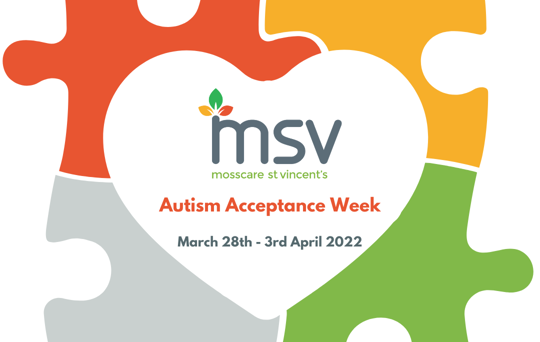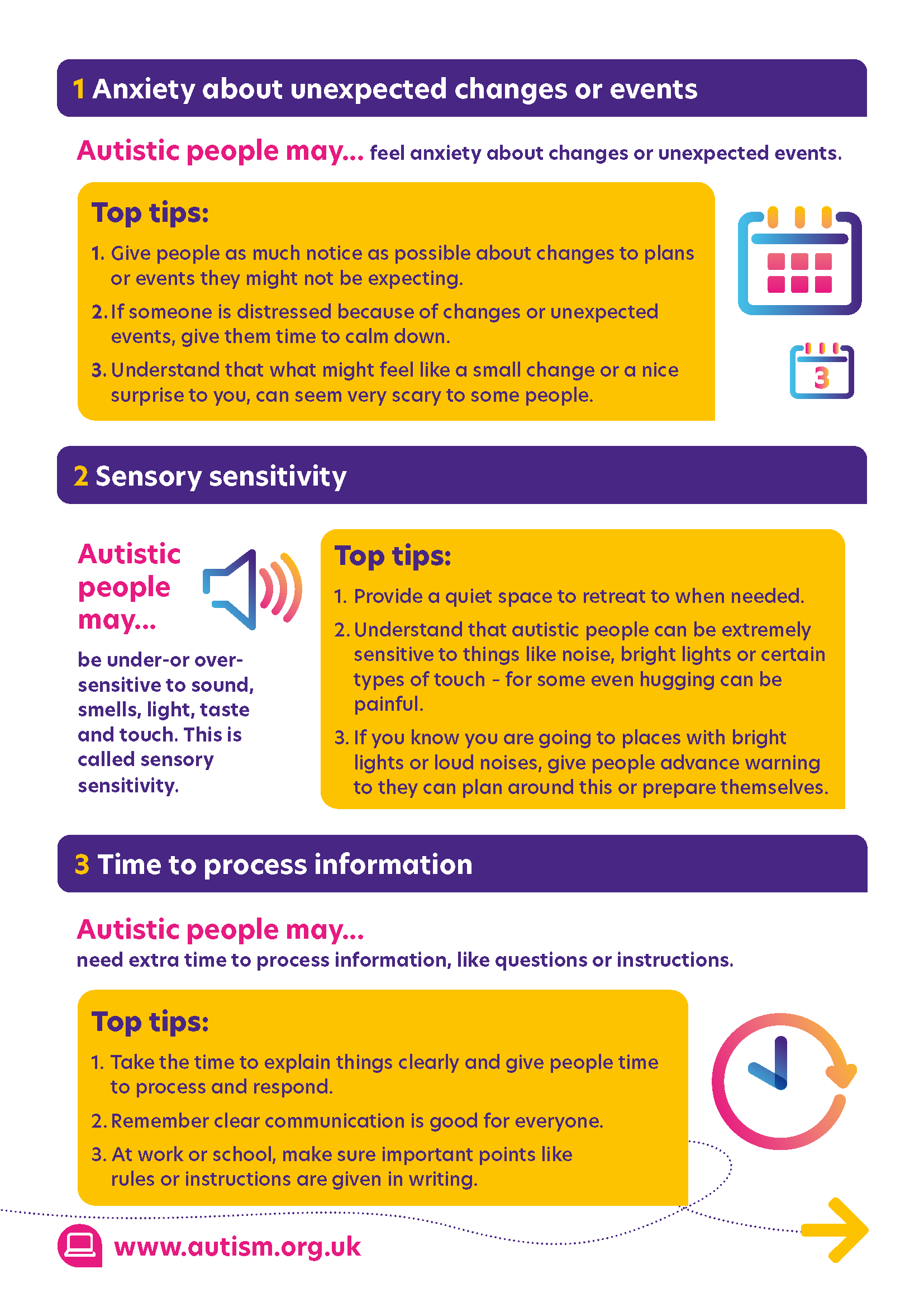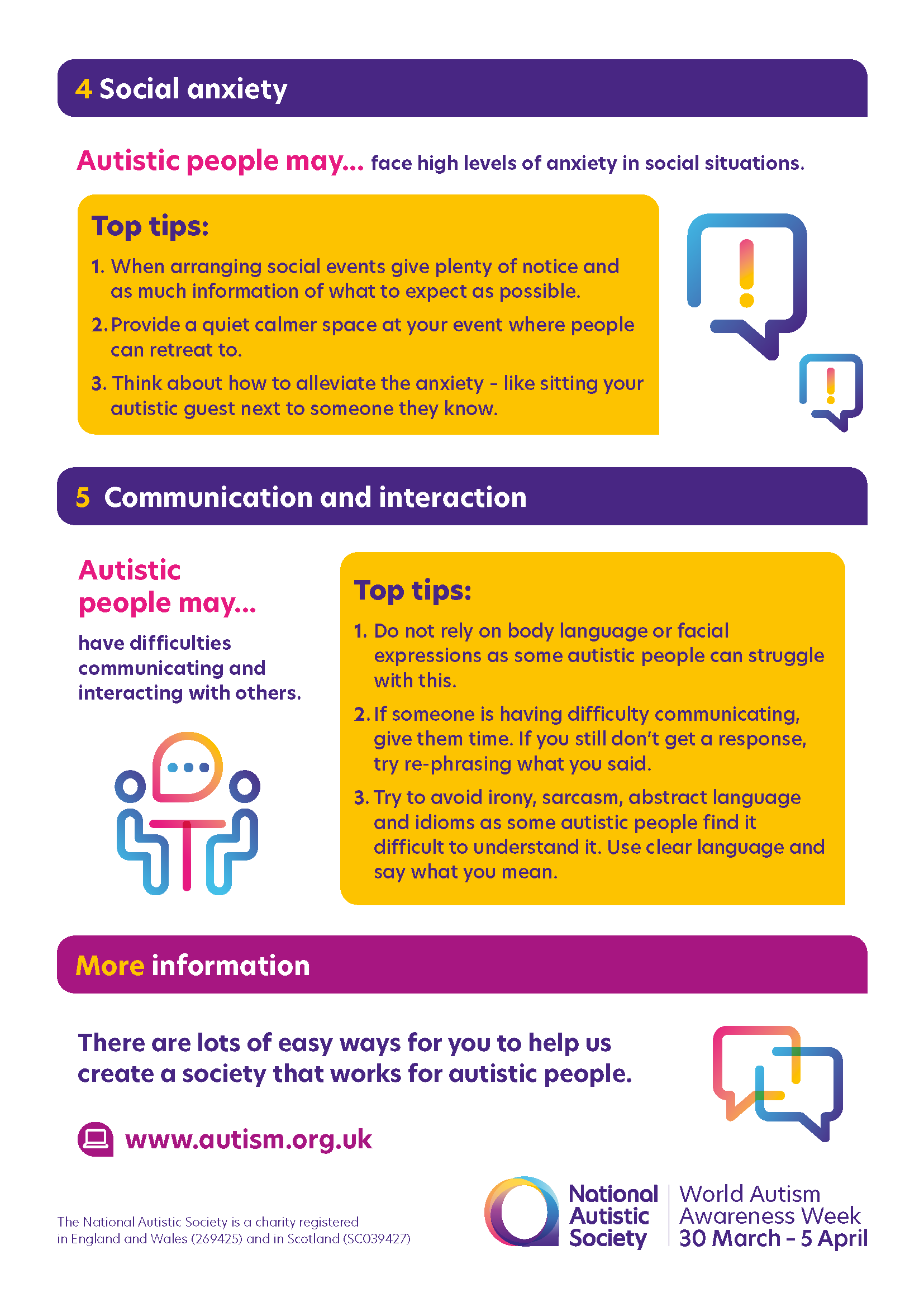This week we are sharing resources to help promote a greater understanding of autism.

Based on feedback, the National Autistic Society have announced that the name has changed this year to World Autism Acceptance Week (from World Autism Awareness Week).
The National Austistic Society explain:
'We’ve come a long way in the past 60 years and today almost everyone has heard of autism. But far too few people understand what it’s actually like to be autistic – both the strengths you can have and how hard life can be at times.
No-one should feel judged for being autistic or have to wait many months or even years for a potentially life changing diagnosis, vital help and support. We need society to change. Autistic children, adults, and their families just want to be understood, supported and accepted in their communities, schools and workplaces.'
Autism is a lifelong developmental disability which affects how people communicate and interact with the world. One in 100 people are on the autism spectrum and there are around 700,000 autistic adults and children in the UK.
Autism is a hidden disability. You can’t tell someone is autistic by the way they look, but possibly through their behaviours. Autistic people are often misunderstood and may require support with things like communication, interaction with others, using their imagination, being flexible and feeling overwhelmed by activity in the world around them.
Here is a list of some common challenges people with autism may face.
Click below to find out how each one may affect peoples lives in different ways -:
Autistic people have difficulties with interpreting both verbal and non-verbal language like gestures or tone of voice. Some autistic people are unable to speak or have limited speech while other autistic people have very good language skills but struggle to understand sarcasm or tone of voice. Other challenges include:
- taking things literally and not understanding abstract concepts
- needing extra time to process information or answer questions
- repeating what others say to them (this is called echolalia)
Autistic people often have difficulty 'reading' other people - recognising or understanding others' feelings and intentions - and expressing their own emotions. This can make it very hard to navigate the social world. Autistic people may:
- appear to be insensitive
- seek out time alone when overloaded by other people
- not seek comfort from other people
- appear to behave 'strangely' or in a way thought to be socially inappropriate
- find it hard to form friendships.
With its unwritten rules, the world can seem a very unpredictable and confusing place to autistic people. This is why they often prefer to have routines so that they know what is going to happen. They may want to travel the same way to and from school or work, wear the same clothes or eat exactly the same food for breakfast.
- Autistic people may also repeat movements such as hand flapping, rocking or the repetitive use of an object such as twirling a pen or opening and closing a door. Autistic people often engage in these behaviours to help calm themselves when they are stressed or anxious, but many autistic people do it because they find it enjoyable.
- Change to routine can also be very distressing for autistic people and make them very anxious. It could be having to adjust to big events like Christmas or changing schools, facing uncertainty at work, or something simpler like a bus detour that can trigger their anxiety.
Autistic people may experience over-or under-sensitivity to sounds, touch, tastes, smells, light, colours, temperatures or pain. For example, they may find certain background sounds like music in a restaurant, which other people ignore or block out, unbearably loud or distracting. This can cause anxiety or even physical pain. Many autistic people prefer not to hug due to discomfort, which can be misinterpreted as being cold and aloof.
Many autistic people avoid everyday situations because of their sensitivity issues. Schools, workplaces and shopping centres can be particularly overwhelming and cause sensory overload.
Many autistic people have intense and highly-focused interests, often from a fairly young age. These can change over time or be lifelong. Autistic people can become experts in their special interests and often like to share their knowledge. Greta Thunberg's intense interest, for example, is protecting the environment.
Like all people, autistic people gain huge amounts of pleasure from pursuing their interests and see them as fundamental to their wellbeing and happiness.
Being highly focused helps many autistic people do well academically and in the workplace but they can also become so engrossed in particular topics or activities that they neglect other aspects of their lives.
Anxiety is a real difficulty for many autistic adults, particularly in social situations or when facing change. It can affect a person psychologically and physically and impact quality of life for autistic people and their families.
It is very important that autistic people learn to recognise their triggers and find coping mechanisms to help reduce their anxiety. However, many autistic people have difficulty recognising and regulating their emotions. Over one third of autistic people have serious mental health issues and too many autistic people are being failed by mental health services.
When everything becomes too much for an autistic person, they can go into a meltdown or shutdown. These are very intense and exhausting experiences.
A meltdown happens when someone becomes completely overwhelmed by their current situation and temporarily loses behavioural control. This loss of control can be verbal (eg shouting, screaming, crying) or physical (eg kicking, lashing out, biting) or both. Meltdowns in children are often mistaken for temper tantrums and parents and their autistic children often experience hurtful comments and judgmental stares from less understanding members of the public.
A shutdown appears less intense to the outside world but can be equally debilitating. Shutdowns are also a response to being overwhelmed but may appear more passive - eg an autistic person going quiet or 'switching off'. One autistic woman described having a shutdown as: 'just as frustrating as a meltdown, because of not being able to figure out how to react how I want to, or not being able to react at all; there isn’t any ‘figuring out’ because the mind feels like it is past a state of being able to interpret.'
Residential and supported living services for people with autism
The consortium of social services departments and Clinical Commissioning Groups in Greater Manchester provides information for autistic people, family members and carers. Their website includes useful housing guides and maps for each borough in Greater Manchester with help and support resources. Find out more
At MSV we have a number of homes across the North West for people with autism, in partnership with the National Autistic Society.
MSV are also in the process of building a large group home for 3 individuals with autism in Stockport where residents will have access to 24 hour care and support facilitated by Stockport Metropolitan Borough Council.
Find out more about autism
Only 16% of autistic people and their families think the public understand autism in a meaningful way.
We want to help increase understanding of autism, please watch and share this short film created by the National Autistic Society to find out more -:
Too much information..
Watch this powerful film made by the National Autistic Society, just one of a number of films showing autistic people in everyday situations to increase understanding about their reality -:
How you can help people with autism
With the help of autistic people and their families, the National Autistic Society has created some handy tips on how to help autistic people.
There are lots of easy ways for you to help us create a society that works for autistic people -:










